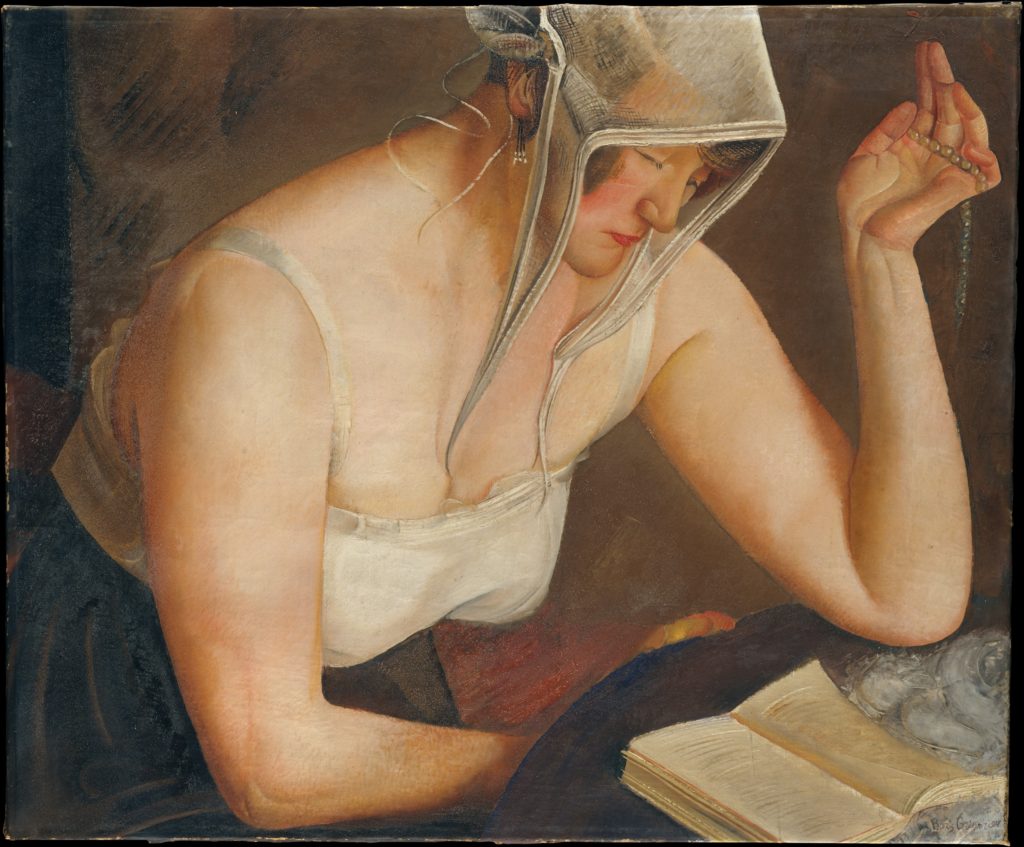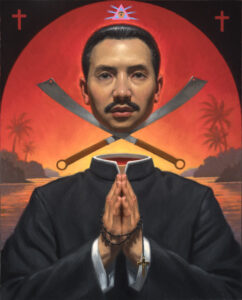Christopher Beha is a 38-year-old novelist and a former editor at Harper’s Magazine. To get a sense of his talent and his themes, consider this New York Times review of Beha’s latest novel, Arts and Entertainments. Michael Ian Black (an actor who has appeared as a recurring character on The Jim Gaffigan Show) called the novel: “A meditation on the inchoate impulses that lead people to expose themselves, often literally, to the world.”
He pointed out that Beha’s hypothesis “arrives early in the novel, as Eddie compares being an altar boy to his early days as an actor: ‘He wasn’t sure he believed the story the church was selling, but he liked about it the same thing he’d liked about acting: the understanding that someone was watching, that every action had a purpose and a meaning.’”
For to the young and aging adults in an increasingly secular culture, “fame offers a quick path to an ancient goal, transcendence.” For “fame promises all we used to ask from religion…a way to give meaning to lives littered with disappointments large and small.” It is hard to pull out the deep spiritual deficits behind reality TV’s rise, but in Arts and Entertainments, Beha does it. He is clearly an important voice in the rising generation of writers.
I first encountered Beha’s work in The Whole Five Feet, a memoir about the year he took off to read the Harvard Classics. The tale was so well-told, so intellectually stimulating, and so full of the next generation’s longing for some form of stability, for grounding, for community, yeah, one could even call it for a “tradition” that they could be part of, as they (and we) plunge headlong into an uncertain future, it took my breath away. I was fascinated in particular by Beha’s deeply Catholic family, to whom he stayed very close, even as he pulled away from the Catholic Church. That is why I noticed when something Beha wrote a few years later hinted that Beha had returned to practicing the faith of his fathers and Our Fathers. He confirmed the hint when Catholic Arts Today asked him for this interview.
I can think of few more interesting minds with whom to continue the discussion the distinguished poet Dana Gioia launched in The Catholic Writer Today. Maggie Gallagher
CAT Editors: Your first book, The Whole Five Feet, was a memoir. Since then you have concentrated on the novel. What led you to the novel, perhaps at the precise moment when the memoir and the film are displacing the novel as a dominant cultural form?
Beha: It has always been my goal to write novels. I spent most of my twenties writing an unpublished novel. I have spent all my thirties writing three novels, two of which have been published and the third of which should be soon. In between, I wrote a memoir almost by accident. I don’t regret it, but it was something of a fluke.
I have always loved reading novels more than doing just about anything else, and I have always wanted to write them. Reading and writing novels is my way of being in the world. I think it’s as simple as that. As for the novel’s cultural dominance or lack thereof, I can only say that it remains the dominant cultural form in my own life.
CAT Editors: In a 2000 essay, novelist Donna Tartt wrote that, “As a novelist who happens to be a Roman Catholic…there is a constant tension between my faith on the one hand, and my vocation as a novelist on the other, since the novel in its history and genesis is an emphatically secular art form.” Do you experience the same tension?
Beha: I haven’t read Tartt’s essay, so I don’t know the sense in which she was using the term ‘secular,’ but I think it’s important to distinguish between the secular world and secularism.
At its root, the word ‘secular’ refers to the mundane, every day passage of time in which all of us, Catholics very much included, live out the bulk of our days on earth. (Saeculum is a Latin word for the length of a human life.) One of the great mysteries of the Church is that it calls its members to live at once in linear, secular time and in circular, liturgical time.
And not just laymen: the stories and novels of J.F. Powers are almost exclusively concerned with the ironies of Catholic priests forced to live their secular existences. In this sense, it is unquestionably true that the novel primarily addresses secular concerns.
The novel is not liturgical art, and it doesn’t generally operate on the epic or mythical scale, like most pre-Christian narrative art. The novel has always taken as its task the representation of the mundane world in which individuals live, love, suffer and die.
But people generally mean more than this when they speak of the novel as a secular art form. They mean instead that there is an important connection between the novel’s rise as the predominant literary form and the rise of secularism as a default viewpoint in the places where the novel flourished.
Secularism is the belief that secular reality is all that exists; or at the very least, all that we can really experience or study or know about, and thus all that we can legitimately take into consideration when making ethical, moral, intellectual or political judgments. I don’t dispute the historical connection, but in my view, the novel is a ‘product of secular society’ in the same sense that hospitals are a product of illness.
Many of our greatest novelists subscribe to the secularist worldview, but I can’t think of a single great novelist—even among the thoroughgoing materialists—who finds the state of affairs secularism describes satisfactory.
In the saeculum, things happen to us and, even as they are happening, they are already gone. Each instant is effaced before it has even made its impression on us. Secularism tells us that this disappearance is absolute. The trouble with secular time is what Milan Kundera calls its ‘lightness’ which is certainly unnerving, if not actually unbearable.
So, I would say that the novelist—whether Catholic or Jew or atheist—is a person for whom secularism presents a problem, and that novels are the particular way in which the novelist seeks to address this problem.
CAT Editors: Tartt also cites the novelist Herman Broch, who spoke of “that which the novel alone can discover.” What do you think that is?
Beha: I wholly agree that there are things the novel alone can discover, but for obvious reasons those are not things I can discover to you here.
Broadly speaking, the novel allows for more flexibility in managing the passage of time than films or plays, both of which must in some sense take place in real time.
Lyric poetry gets its power from compression; the novel from unfolding. Lyric poems are exceptionally good at conveying those brief moments of insight or revelation when we seem to be raised out of the mundane into a higher plane. But the question most of us are left with is how we integrate those moments into our mundane existences. The novel seems formally better suited to engaging with this question.
CAT Editors: The British novelist and priest David McLaurin argues novels are greater in ages of weak faith: “In many ways [Evelyn Waugh] was right: … Doubt and debate are the order of the day” He goes on to say, “Whether it is a good thing or a complete disaster is a matter of opinions … But I will say this: it is good news for the novel.” Is he right about that?
Beha: Well, if I am right that great novels are a response to the problem posed by secularism, then it stands to reason that some amount of doubt would be not just beneficial but necessary for the novel.
Those rare saints and mystics who close the gap between themselves and God to such a point that they can see all the secular world—including the passage of their own lives—sub specie aeternitatis might create great devotional poetry, but such lucky souls are unlikely to produce great novels.
As Auden put it, the novelist “must suffer dully all the wrongs of Man.”
CAT Editors: Who do you consider the greatest living Catholic novelist?
Beha: My definition of what constitutes a Catholic novelist is a bit eccentric. I believe that everyone on my shortlist was at one point baptized into the Church, but I can’t speak to their current doctrinal commitments. Also, I make no claims about greatness in some abstract or objective sense. I can only speak to which novelists have been important to me as a reader and a writer. That said, the living Catholic novelists who have meant the most to me are Alice McDermott, Annie Dillard, Don DeLillo, Thomas Pynchon, and Edward P. Jones.
CAT Editors: The secular literary world appears to many artists to be closing doors to portraying people of faith. Could this be an opportunity in the sense there is a complex, interesting world not being explored by very many creative imaginations? Can a novelist succeed being a contrarian to the dominant culture?
Beha: Do people of faith really have different concerns than everyone else, or just different resources for meeting universal concerns?
Some commentators who complain about a dearth of Catholic novelists seem to be making a statement about cultural underrepresentation. They want writers who will depict the Catholic American ‘experience,’ in the way that other writers are celebrated for depicting the African American experience, the Asian American experience, the immigrant experience, etc.
But Walker Percy and Flannery O’Connor—one an adult convert, the other a cradle Catholic who grew up well outside the typical American ethnic Catholic strongholds—did not live in Catholic enclaves. They did not dedicate themselves primarily to rendering Catholic experience. They wrote about the general human predicament, with a view of this predicament that was deeply influenced by their Catholic faith.
Because this predicament is a general one, their work appeals to all sorts of readers who don’t share that faith. My experience is that the people who work in the mainstream literary world are eager to publish good work that engages seriously with matters of ultimate concern, so long as that work can be read by a general audience.
As for being contrarian to the dominant culture, a novelist can only succeed this way, since the currently dominant culture does not have much time for the interior life to which readers and writers of the novel are committed.




